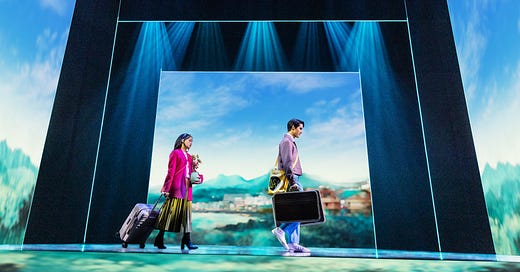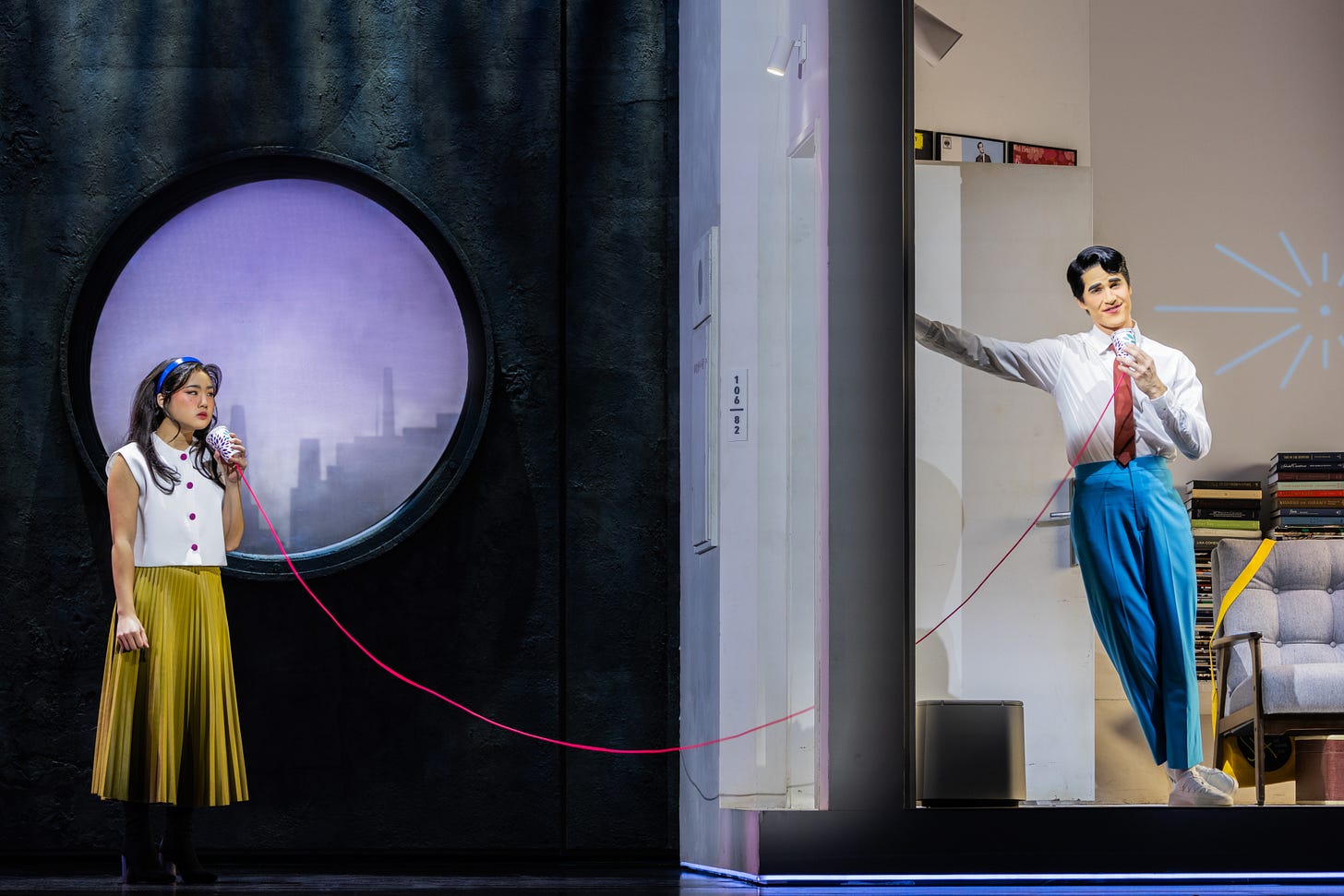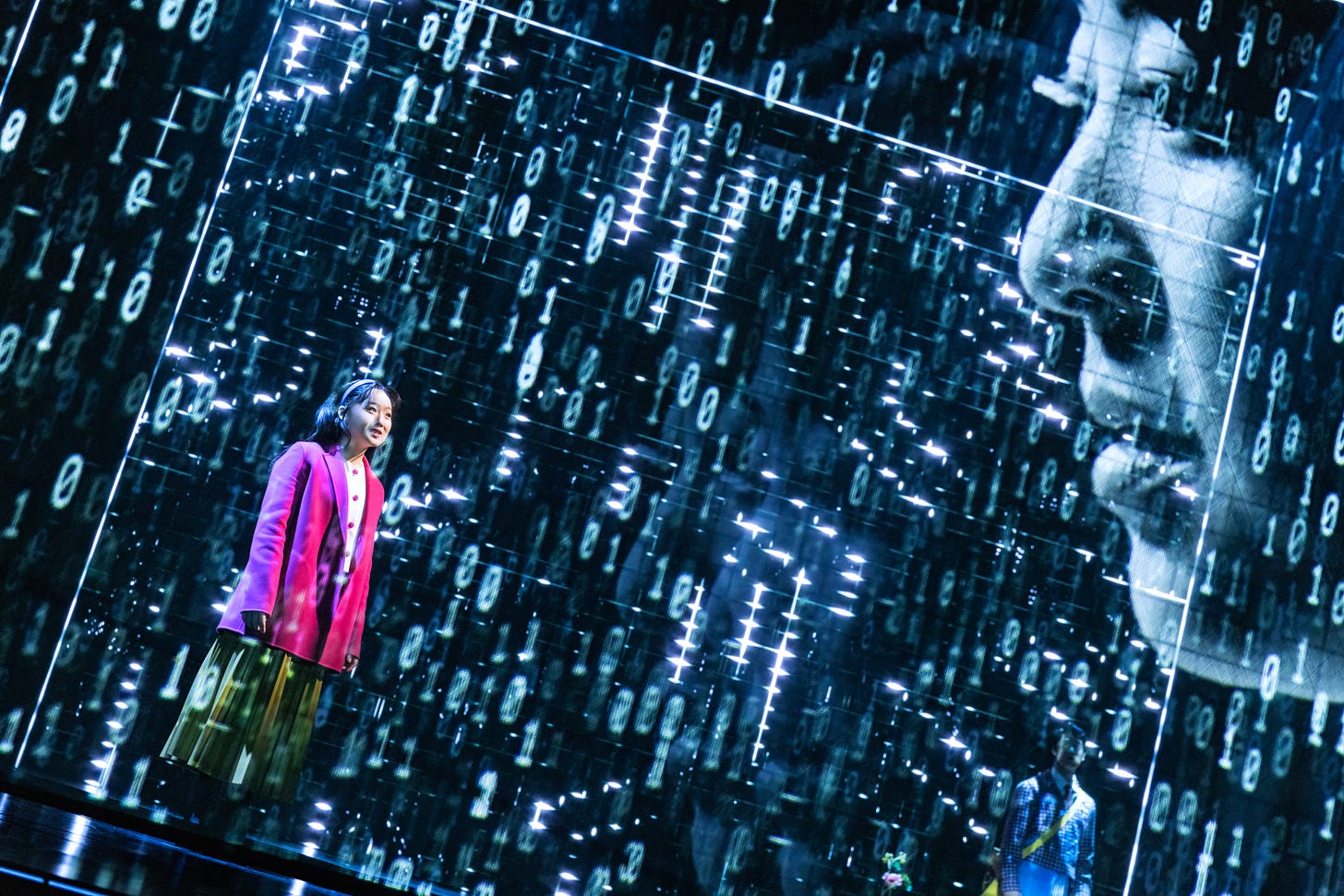Sympathy for the AI in Maybe Happy Ending
(Spoilers for the musical Maybe Happy Ending are found ahead.)
If all you knew going into the musical Maybe Happy Ending was that it's about robots, you might be surprised when the first sound you hear after the lights dim turns out to be the warm crackle of a vinyl record playing a crooner's rendition of a mid-century jazz standard that is so convincingly written that I have heard people second-guess whether it was written for the musical, or an actual song of the era. Yet although it is set in the not-too-distant future, Maybe Happy Ending, currently playing on Broadway at the Belasco Theatre, is surprisingly nostalgic, and speaks to contemporary anxieties about improving technology, including artificial intelligence, coming to replicate and even supplant human art and experience.
Maybe Happy Ending follows two artificial intelligences — Helperbots named Oliver and Claire, who are fascinated by the low-tech. And, though high-tech to us in the year 2025, by the standards of the musical's world, both are outdated models, making themselves low-tech (relative to the world of the musical) as well.
Oliver was brought up by his former owner James to have a taste for mid-century jazz music, in particular the fictional crooner Gil Brently, who incorporates influences of Duke Ellington, Chet Baker, and other jazz musicians of the era. Oliver collects vinyl records, parroting James' assertion that "LPs sound more real than all the technology that came after them." (Amusingly, Oliver repeats this by playing back a recording of James saying it, which raises the question of how Oliver could even tell the difference, being that his own hardware presumably processes the audio digitally — yes this was a joke in Futurama.)
Claire, for her part, is fascinated by fireflies, and it is her dream to visit the one place on earth where fireflies still live in this bleak future. (In the projection-heavy production, the fireflies themselves are represented by comparative low-tech blinking LEDs.) Claire is in particular fascinated by the ephemerality of the fireflies' short lifespan, which is resonant in her as she is forced to grapple with her own mortality after her charger stops working — the inciting incident of the plot, as it is her knocking on Oliver's door asking to borrow his charger that causes the two to meet.
Well, as it turns out, Oliver and Claire's goals are compatible: Claire wants to travel to see the fireflies, Oliver wants to travel to reunite with James, and James and the fireflies happen to live in the same place; And in a Jacobowsky and the Colonel-esque coincidence of forced cooperation, Claire can drive, but doesn't have a working charger, while Oliver has a working charger, but can't drive. So, forced to team up to achieve their aims, the two Helperbots set out on a Robot Road Trip Rom Com.
Along the way, they go through the familiar beats of such a story. They bicker, and they bond, and they fall out, and they get back together. On such comfortable ground, it is not difficult to see where the story is going next, which helps to put the audience at ease. The characters endear themselves to the audience through their childlike games of pretend as they communicate through two cups on a string, and fantasize about their make-believe backstory in case any humans ask them where they're from. The effect is reminiscent of children playing make-believe with what random odds and ends are lying around for use as toys.
The low-tech theming carries into the orchestration of the musical itself, which, despite the subject of robots, eschews electronic instruments almost entirely (an electric keyboard is used in place of harp and some mallet percussion) in favor of a prominently-featured ten-piece band comprising a string quartet, two brass, one reed, bass, percussion, and keys. The orchestrations, by composer Will Aronson, use acoustic instruments to create robotic effects, inverting the more typical way of using electronic keyboards to supplement or outright replace acoustic instruments. The musical presents a futuristic world of robots and artificial intelligences, but one which constantly hearkens back to the analog days of yore, even carrying into the mere presence of this futuristic setting embedded in the old-fashioned and ornately decorated Belasco Theatre.
Oliver and Claire’s immersion in human art and activity serves to set up an all-the-more crushing blow when Oliver and Claire reach their destination and we learn at last why the two Helperbots were abandoned by their owners — the event which left them stranded and helpless — in the first place.
We learn Claire's backstory first: Her owner Jiyeon retired her when Jiyeon's boyfriend Suhan fell for, and confessed his love to Claire. Claire relates this experience to prepare Oliver for a similar blow when he discovers that James never had any intention of returning for him. In fact, the blow does not come quite as Claire predicted: By the time Oliver arrives, James had already died some time ago. Oliver instead meets James' son Junseo, who reveals that he (Junseo) was the one who made James leave Oliver behind, because "it was hard enough for us to talk without having his perfect fake son around."
In this moment, the audience is forced to reconcile two conflicting elements: On the one hand, these two charming robots whom we have come to like and root for as they learn more about human behavior and emotion; and on the other hand, the question of whether we want for robots to be able to replicate human art and experience in the first place. What was endearing in Oliver and Claire’s behavior is suddenly reframed as uncanny, and Oliver and Claire themselves are forced to come to terms with the idea that the best thing they can do for the humans they are programmed to care about is to leave them.
The fictional premise of robots being fascinated by aspects of human emotion and creativity is nothing new. It is a significant aspect of Star Trek’s Lt. Commander Data; if you replace Oliver’s potted plant HwaBoon with an adorable cockroach, and swap out Gil Brently for Hello, Dolly!, you have the makings of WALL-E; and, of course, it is the premise of countless Bender storylines in Futurama. But Maybe Happy Ending comes in at a moment when artificial intelligence is rapidly becoming a more and more unavoidable aspect of everyday life. Bender attempting to become a folk musician was funny at the time, but now that generative AI is being used in the real world to take the place of human artists, it starts to seem less cute.
That Maybe Happy Ending addresses these anxieties, leading us down the garden path of coming to love these AI characters, before pulling the rug from under our feet, is perhaps a contributing factor to the musical’s resonance with contemporary audiences. It raises questions about the use of AI technology without demonizing the existence of said technology as an inherent evil, and it criticizes aspects of modern technology without resorting to a robot apocalypse. In a way, Maybe Happy Ending presents a critique of AI technology while preserving sympathy for the technology itself, and the dissonance between these two elements is part of what makes the show so effective. It also makes Maybe Happy Ending one of the most fascinating, thought-provoking, and haunting new musicals to hit Broadway in years.






